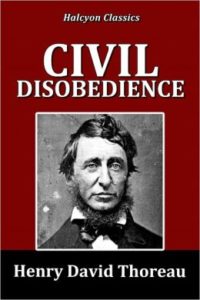Or
Thoreau gives the highest importance to conscience and least importance to majority. Explain.
Or
Thoreau’s conception of an ideal democracy is based on conscience, rather than on majority. Do you agree?
Or
What should the people do if their conscience is wounded by the State?
 Answer: Thoreau is an idealist in political thought, and his idealism is expressed in the present statement that conscience rather than majority should rule the state. He has also showed the form of ideal democracy based on conscience. He calls for revolution when the conscience of citizens is wounded.
Answer: Thoreau is an idealist in political thought, and his idealism is expressed in the present statement that conscience rather than majority should rule the state. He has also showed the form of ideal democracy based on conscience. He calls for revolution when the conscience of citizens is wounded.
The majority in democratic government is permitted to rule but that does not mean that they are in the right and fairest position to the minority. The author says,
“But a government in which the majority rules in all cases cannot be based on justice, even as far as men understand it. Can there not be a government in which majorities do not virtually decide right and wrong, but conscience—in which majority decides only those questions to which the rule of expediency is applicable? Must the citizen ever for a moment or in the least degree, resign his conscience to the legislator. Why has every man a conscience? I think that we should be men first, and subjects afterwards.”
A perfect government should rule on the basis of conscience, not majority. Conscience should prevail over law. The mass of men that serve the state as machines—the militia, jailers, and constables. They do not exercise judgment or moral sense, yet they are regarded as good citizens. But, unfortunately, heroes and patriots who serve the State with conscience are commonly treated as enemies.
[adToAppearHere]
Thoreau thinks that the majority in a so-called democracy is permitted to rule for long, not because they possess conscience, but because they have night Conscience is the quality in man which enables him to do justice to all his fellow beings, and behave with others with all fairness. Since a State consists of men, and men possess conscience, conscience should be the ruling principle, not majority. In a democratic State, the majority should not decide what is right and what is wrong. It is man’s God-gifted quality, conscience which should decide right and wrong. A citizen should not resign his conscience to the legislator. This conception of the role of conscience in democracy places man far above his status as a political being, not merely as a member of a democratic state. Conscience was given by the Creator to man to enable him to distinguish between right and wrong. A man is a man first, and secondly a citizen of a state. This is a revolutionary idea about the form of government that a state should have.
Thoreau was an idealist thinker, and it is quite natural that his ideal of democracy should be diametrically opposite to the materialistic view of democracy which is the most commonly accepted notion about it. The materialist view of democracy is what was given by Abraham Lincoln. He said, “…and that government is of the people, by the people, and for the people, shall not perish from the earth.” Thoreau’s view goes completely against this view. His view is rather akin to that of Earl of Roscommon, a 17th century British philosopher, who said, “The multitude is always in the wrong.” Or it is consistent with the opinion of Dean Inge, a British churchman of the 20th century who said, “Democracy is only an experiment in government and has the obvious disadvantage of merely counting votes instead of weighing them.” Instead of following the traditional, materialistic view of democracy, Thoreau has given a novel idea of democracy which should be based on the spiritual, rather than the material. He thinks it is a man’s spiritual quality, his conscience which distinguishes between right and wrong, moral and immoral, justice and injustice. If conscience becomes the guiding principle of democracy no harm or injustice will be done to anybody, and man can be absolutely free only if such a democracy is established.
[adToAppearHere]
When conscience is wounded, one should regard it as bloodshed. A man’s real manhood and immortality flow out through such a wound and he bleeds to an everlasting death. So a man’s duty should be to prevent such wounding of the conscience so that he may not die everlastingly; he should bring about a peaceful revolution against any government that causes the wounding of his conscience. The state wounds the conscience of people, for example, by imposing some unjust laws upon them as obligatory. Thoreau has suggested several ways regarding what the people should do against such unjust laws. He has also suggested that the state should be so democratic as to encourage people to point out the faults of the state. Both the state and people should have equal contribution. Conscience should be the basis of all undertakings. The faults of one should be removed by the benevolent interference of the other. There should be no wounding of conscience, rather based on conscience everything should be decided by mutual co-operation and understanding of the state and of the people.




